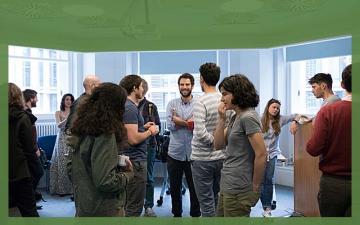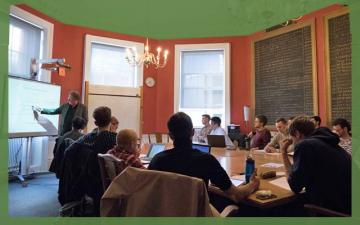Undergraduate Open Day
Philosophy at the undergraduate level is always studied at Oxford as part of a multi-subject degree, along with one or more other disciplines. To investigate the degrees and ask questions about admissions, you should attend an open day at Oxford, going to talks and events for the partner subject you would want to study philosophy with. The joint degrees can be asked about there; there will often be current students studying for the joint degrees, and members of academic staff may be on hand to answer questions or be giving talks.
Information about the open days can be obtained here: via this link, you can download a programme and click through to the different department and faculty information.
Our degrees, and the departments you should look for, are as follows.
Literae Humaniores (= Classical languages and literature, Ancient History,Philosophy): Classics Faculty
Philosophy and Modern Languages: Faculty of Modern Languages (NB: requires advance booking)
Philosophy and Theology: Faculty of Theology & Religion
Philosophy, Politics and Economics: look on the PPE Website; events at Social Sciences Building
Computer Science and Philosophy: Department of Computer Science
Mathematics and Philosophy: Mathematics Department
Physics and Philosophy: Physics Department
Psychology, Philosophy and Linguistics: Department of Experimental Psychology (events in Examination Schools)
Colleges will also give an opportunity to meet current students and tutors, and many of these do not require advanced booking; the link above gives a list of all the colleges admitting students to read for undergraduate degrees. You can click through to read their programmes and start to plan your day. There is advice on planning your day here, and a searchable map (which may take a moment to load) here.
The day is principally aimed at those who are about to apply through UCAS, but those at an earlier stage of investigating universities will still be welcome.
Visits outside of the open days
We regret that it is generally not possible to arrange ad hoc visits for interested applicants, and strongly encourage attendance at one of the open days: they are by far the most efficient way of getting some idea of the Oxford student experience.

© Keiko Ikeuchi

© Keiko Ikeuchi

© Mathematical Institute, University of Oxford
Useful Links
If you are interested in one of these degree programmes, and are on target to achieve results in your current qualifications at the level indicated, then yes, absolutely. We’ll be pleased to see you, and hope you’ll find the day interesting. A quick summary can’t cover all of the nuances of the full prospectus, but this table gives an idea:
|
Degree |
Essential |
Recommended |
Helpful (not required) |
Standard Offer Grades |
|
Literae Humaniores |
Course I (only): Latin and/or Greek |
|
|
AAA, IB 39 (666 at higher level) |
|
Philosophy & Modern Languages |
A modern language for your chosen course |
|
|
AAA, IB 39 (666 at higher level) |
|
Philosophy & Theology |
|
|
Essay-based subject |
AAA, IB 39 (666 at higher level) |
|
Philosophy, Politics & Economics |
|
Mathematics |
History |
AAA, IB 39 (666 at higher level) |
|
Computer Science & Philosophy |
Mathematics |
Further Mathematics or a science |
An essay-based subject |
A*AA, IB 39 (766 at higher level) |
|
Mathematics & Philosophy |
Mathematics |
Further Mathematics |
|
A*A*A, IB 39 (766 at higher level) |
|
Physics & Philosophy |
Physics, Mathematics |
Mechanics module in Maths |
Further Mathematics, Arts subject |
A*AA, IB 39 (766 at higher level) |
|
Psychology, Philosophy & Linguistics |
|
Mathematics, science subjects |
English language (for Linguistics) |
A*AA, IB 39 (766 at higher level) |
There’s a version of Literae Humaniores, Course 2, which does not require classical languages to A level (or an equivalent level in other qualifications); there are some modern languages which can be studied as a ‘beginner’ in Philosophy and Modern Languages. For either, you’ll still need to have an aptitude for languages! In Psychology, Philosophy & Linguistics (PPL) you apply for just two of the three subjects, and each pair has a separate course code, which is very different from Philosophy, Politics & Economics (PPE) where you apply for all three (though you can study just two from second year onwards). For some degrees there will be a requirement to get an A* or equivalent in a specific subject; Physics and Philosophy will want an A* in Physics, Mathematics or Further Mathematics (or 7 at higher level on the IB in Maths or Physics). Standard offer grades are listed for A levels and the International Baccalaureate, but can be found on-line for many other qualifications.




